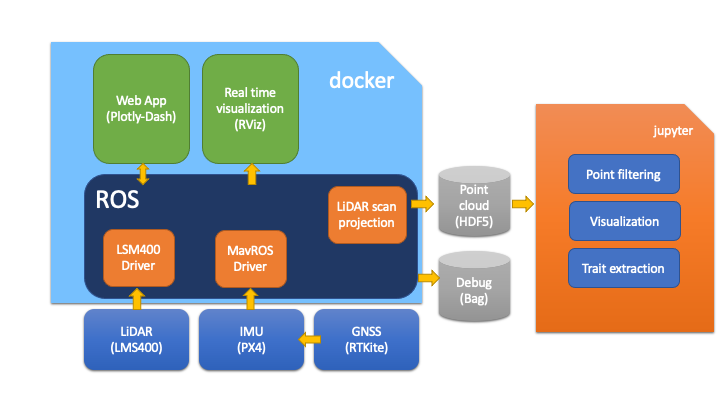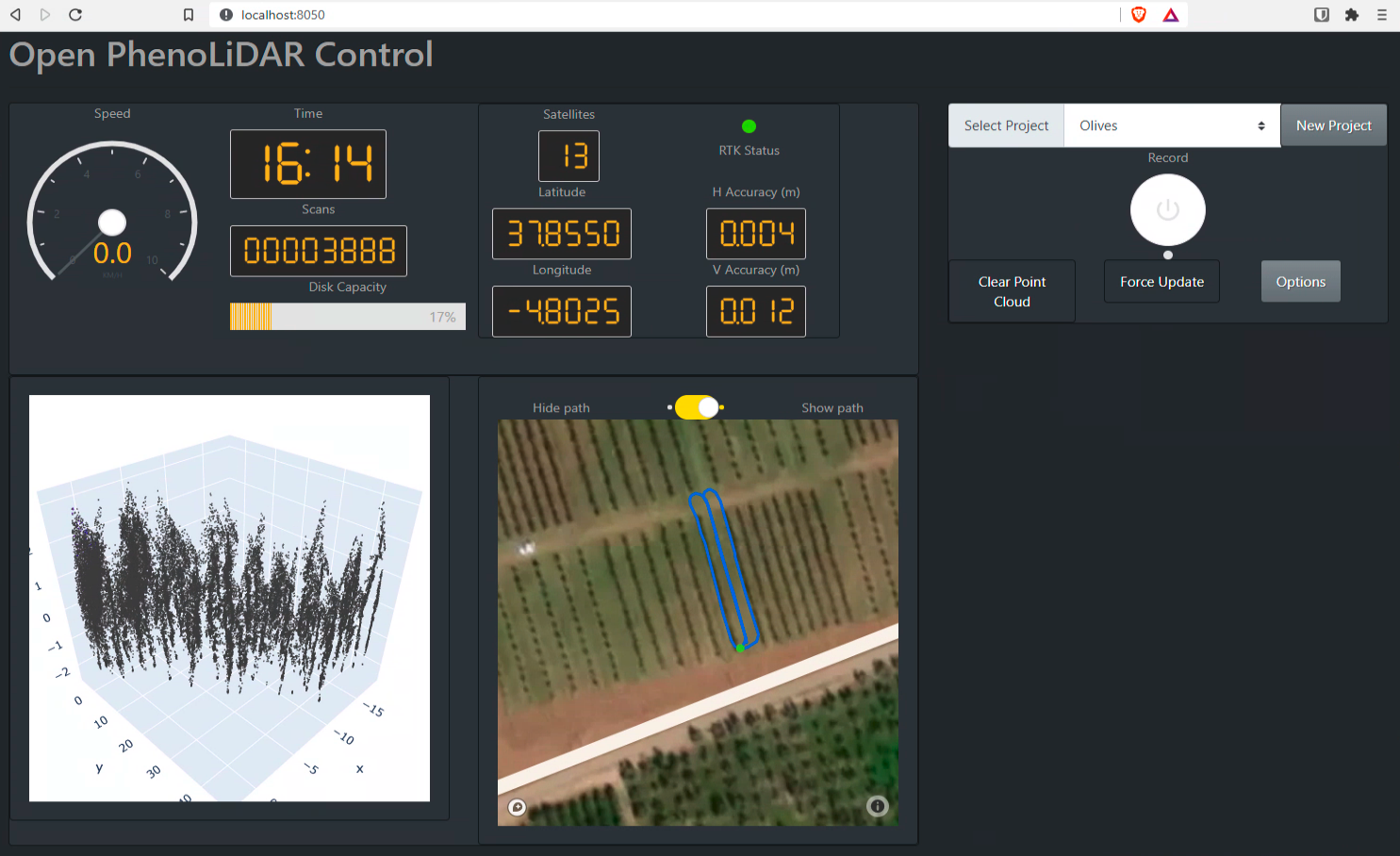Citation: Jose A. J. Berni, & Sergio Bellido. (2021, July 14). OpenAgriTech/Open-PhenoLiDAR: Public realease for Zenodo (Version 0.1.1). Zenodo. http://doi.org/10.5281/zenodo.5101085
Open PhenoLiDAR, an open-source pipeline for integrating LiDAR sensors in plant phenotyping and, more broadly, for crop monitoring applications. Open PhenoLiDAR spans from data acquisition (including instructions for integrating the LIDAR and GNSS receiver) to data analysis and obtaining primary plant traits. The data acquisition and sensor integration are developed using ROS (Robotic Operating System), which provides modularity for adopting different LiDAR models and GNSS/IMU receivers. ROS also enables compatibility for integrating other sensors, such as machine vision or hyperspectral cameras. ROS also presents advantages for further adoption of robotic solutions or autonomous navigation. The current version supports the LMS400 (Sick, Germany) LiDAR. Open PhenoLIDAR also offers a low-cost alternative to higher grade commercial IMUS to obtain the orientation and georeferencing. Specifically, Open PhenoLIDAR combines a PX4, a popular open-source autopilot, providing attitude and orientation, with a dual antenna RTK GNSS model RTKLITE (North Surveying, Spain). The user interface is web-based, thus accessible with any web browser locally or over the internet. It is developed using Plotly-Dash and Python. It consists of a dashboard for visualizing key metrics from ROS and a base map with the current trajectory. It also offers simple project management for creating new projects and setting up the data capture.
The point cloud data from the LiDAR is generated in real-time through ROS and stored locally using HDF5 as the standard data format. Other options for data storage include Bag files, the standard ROS data format, which can provide further opportunities for post-processing and debug.
The development of an open-source implementation for capturing and analyzing LiDAR data in field phenomics applications can facilitate the adoption of this technology by other groups and companies wanting to apply phenomic tools in their operations or research.
To assist with deploying the Open PhenoLiDAR under different hardware configurations and preventing incompatibility with other software libraries or ROS versions, Open PhenoLiDAR can run as a virtual container using Docker.
Open PhenoLiDAR also includes basic python analysis templates for performing point cloud filtering, which is essential in the LMS400 LiDAR.
We invite the plant phenotyping and remote sensing communities to join this initiative, contribute to the project and promote open source and reproducible data acquisition and analysis pipelines.
Open PhenoLiDAR can run on multiple architectures like Raspberry Pi or Jetson embedded computers.
First clone or download this repository in your local computer.
git clone https://github.com/OpenAgriTech/Open-PhenoLiDAR.gitInstall Docker and docker-compose in your computer following the official instructions. There are some specific instructions online for the Raspberry Pi like this one. On the Jetson, Docker is already installed, so you only need to install docker-compose.
To avoid having to run docker as sudo everytime you can run sudo usermod -aG docker $USER
Then download the demo bag file into the demo_data folder. See the README in that folder.
Run docker-compose up in the same folder where docker-compose.yml is.
Connect to http://localhost:8050 to see the dashboard interface.
Open PhenoLiDAR uses ROS for the sensor integration. This provides flexibility for the integration with other sensors. At the moment, the system supports the Sick LMS400 and the PX4 Autopilot for positioning. An RTK GNSS connected to the PX4 is required to ensure proper positioning accuracy. Instructions and parameters for the PX4 autopilot are available here. Keep in mind that other RTK GNSS modules are also an option (eg. PX4 RTK reference). GPS heading from dual antenna is desirable as the magnetometer calibration can be tricky due to the metal parts of your robot/frame.
You can change the LMS400 IP address using Sick SOPAS Engineering tool. The rest of the parameters such as scan rate and filters are configured by ROS.
Parameters such as LiDAR IP, angles and devices are specified in the docker-compose file (limited to Sick LMS400 and PX4 autopilots). Alternatively, you can run Open PhenoLiDAR natively on ROS for more advance configurations (see ROS Implementation)
You can use docker-compose-hardware.yml as a template:
environment:
- "LIDAR_IP=192.168.110.25"
- "LIDAR_ANGLE=-1.3735"
- "RECORD_BAG=0"
- "RECORD_FOLDER=/data/bags"
devices:
- "/dev/ttyUSB0:/dev/ttyUSB0"LIDAR_IPthe IP address of the LMS400.LIDAR_ANGLEthe rotation of the LMS400 in radians: 0 is horizontal.RECORD_BAG0 don't save bag files, 1 save bag file with all the topics.RECORD_FOLDERdestination of the bag recordingdevicesdevice address of the serial device of the PX4
Make the necessary modifications to adapt it to your actual settings and you can run with docker-compose -f docker-compose-hardware.yml
At the moment, the real time point cloud plot resets the view on every refresh. We are trying different alternatives and configuration to make more useful.
The frequency of the point cloud generation in ROS is not as fast as the actual scan rate from the LiDAR. To get full LiDAR resolution it is necessary to post-process the data.
You can use ROS natively without using Docker. Follow the instructions in ROS Setup to get a ROS environment in your computer. The instructions may change slightly depending on your Linux Distribution.
This software was developed as part of the project AGL2017-85222-R funded by MCIN/AEI/10.13039/501100011033 and "ERDF A way of making Europe".

